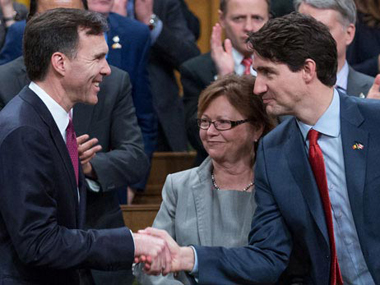Prime Minister Justin Trudeau congratulates Finance Minister Bill Morneau after he put Canada deeper in debt. (Photo: Government of Canada)
As Canada’s new government unveiled its first of a series of deficit budgets, juniors applauded the one-year extension to the 15% mineral exploration tax credit. When harmonized with British Columbia’s flow-through, for example, a B.C. resident qualifies for a combined credit of about 32%, the Association for Mineral Exploration B.C. pointed out.
Along with the Prospectors and Developers Association of Canada, AME B.C. also supported the feds’ proposal to allow expenses relating to environmental studies and community consultation to qualify for credits. “Engagement with project stakeholders and environmental planning and management are key components of mineral exploration and development programs,” said president/CEO Gavin Dirom.
The association also welcomed $87.2 million for Natural Resources Canada projects supporting research in forestry, mining and minerals, earth sciences and mapping, and innovative energy technology.
“This investment will extend the useful life of aging laboratories and reduce the impact of antiquated work spaces on the delivery of Natural Resources Canada’s science priorities,” the budget stated. That money was “long overdue,” according to the Mining Association of Canada.
MAC also noted investments in the Canadian Environmental Assessment Agency, as well as Fisheries and Oceans Canada, “that will help ensure sufficient capacity exists to carry out efficient regulatory reviews of major mining projects.”
Among other improvements, the budget resolves “a tax irritant of double taxation of GHG emission allowances,” MAC added. Other features embraced by the association include up to $800 million to “support innovation networks and clusters” and a proposed four-year, $1-billion commitment for clean technology and innovation in natural resources. MAC expressed hope that infrastructure funding—more than $120 billion over 10 years—will improve transportation and northern development.
But the NWT and Nunavut Chamber of Mines called for “direct spending on new nation-building northern infrastructure in roads, power and ports,” something the organization didn’t see specified in the budget. The chamber welcomed the increase in the northern cost-of-living deduction, pilot funding for the Aboriginal Skills and Employment Training Strategy, continued funding for the Canadian Northern Economic Development Agency “to improve the timeliness, predictability and transparency” of regulatory reviews, ongoing support for northern geoscience projects and money for research and traditional knowledge of the arctic environment.
What the chamber recommended but didn’t get was a higher exploration credit for northerners “given the competitive disadvantage we face due to higher costs.” Other neglected requests included support for settlement of northern aboriginal land claims and “curbing the increased alienation of lands and waters in conservation areas.”
PDAC expressed overall satisfaction with the Liberals’ first effort. “The budget adopts a holistic approach to resource development with support for innovation, financing, aboriginal and community consultation, and northern economic development,” said president Bob Schafer.
Read more at the original source: http://resourceclips.com/2016/03/24/miners-explorers-respond-to-federal-liberals%E2%80%99-first-budget/

